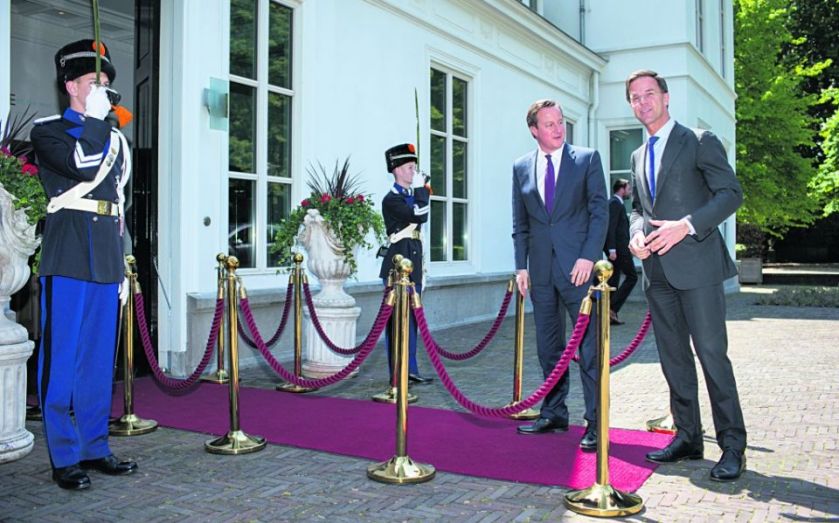David Cameron goes Dutch on first leg of EU reform tour: The Netherlands is a good start as the PM looks for allies

“Old friends and like-minded allies” was how David Cameron described the relationship between the UK and the Netherlands when he was in The Hague yesterday, kicking off his whistle-stop tour of visits to EU leaders to build up support for the changes he wants to made to European policy.
“Like-minded” has certainly been the case for the two countries and their pursuit of balanced books and fiscal prudence.
Ratings agency Standard and Poor’s forecasts that Dutch state debt will peak this year at just over 68 per cent of GDP, as the country continues fiscal austerity measures and the economy grows. And while the UK’s huge level of national debt is much higher, at nearly 80 per cent, the government is seen to be making efforts to eliminate the annual deficit by 2020.
Like its British equivalent, the Dutch government is also about to start selling off a large state-owned bank – ABN Ambro – that was rescued from the abyss during the financial crisis. In the UK, the state is around half way through selling off its share of Lloyds Bank, while an exit from RBS is believed to be coming sooner rather than later.
As like-minded as the two countries may be, the Dutch economy is one of Europe’s underachievers, while the UK – at least in recent times – has been viewed as more of a relative success story.
The Dutch economy is still around two per cent smaller than it was at the start of 2008. This compares to Germany which is five per cent larger, and does not even match up to France.
The countries’ jobs markets, which had similar rates of unemployment before the financial crisis (of around five per cent) have had different fortunes in recent times. Of the 17m-strong Dutch population, 7.7m are in the labour force. Of those, seven per cent are unemployed. Meanwhile, the UK’s jobs boom has taken unemployment near to pre-crisis levels.
One recent hope for the Dutch economy has been an upturn in consumer spending, but economist Jessica Hinds from Capital Economics believes it will struggle to gain momentum.
“The consumer revival still faces a number of significant headwinds, notably the fragile labour and housing market recoveries, the heavy debt burden of Dutch households and the government’s ongoing commitment to fiscal austerity,” Hinds said.
During his trip, Cameron hopes to strike a deal with Europe that will avoid a Brexit following a referendum next year or in 2017.
The Dutch would have a lot to lose from seeing their “old friend” drop out of the EU clique. The country’s largest banking group ING has said that the Netherlands would lose an important ally in advocating market-oriented reforms in the EU.
ING also estimates that annual exports to the UK total €47bn (£34bn) and contribute 300,000 jobs to the Netherlands.
For Britain, the Netherlands is the fourth largest export market and the third biggest source of imports.
Furthermore, City A.M. understands that at least one large bank is eyeing up a move to Amsterdam, in the event of a Brexit. Cameron will be hoping that his renegotiation is a historic success – and that none of the City’s big financial players replicate his trip to the Netherlands in a few years’ time.